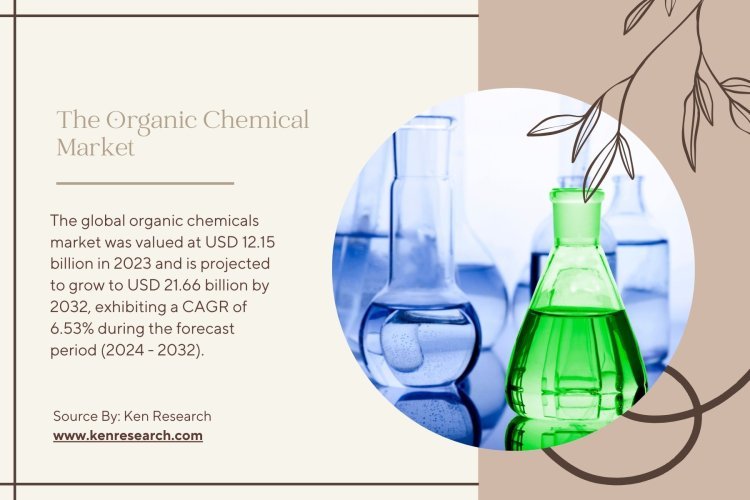The Case Study of the Top companies in the organic chemical market by 2023-2030
organic chemicals market presents significant opportunities amidst evolving consumer preferences for sustainable and natural products.
The global organic chemicals market was valued at USD 12.15 billion in 2023 and is projected to grow to USD 21.66 billion by 2032, exhibiting a CAGR of 6.53% during the forecast period (2024 - 2032). This growth is fueled by increasing demand for eco-friendly and sustainable products, coupled with expansions in key end-use industries such as pharmaceuticals and agriculture.
Top Companies in the Organic Chemicals Market

The organic chemicals market is characterized by intense competition among several major players who have established themselves through extensive product portfolios, innovative technologies, and strategic investments.
PPG Industries (US)
- Revenue in 2023: $16.8 billion
- PPG Industries is a global leader in paints, coatings, and specialty materials, with a significant presence in organic chemicals, particularly solvents and resins used in coatings.
AkzoNobel (Netherlands)
- Revenue in 2023: $10.5 billion
- AkzoNobel is a prominent global paints and coatings company, also excelling in organic chemicals production, including solvents and resins.
Reliance Industries (India)
- Revenue in 2023: $93.6 billion
- Reliance Industries is a diversified conglomerate with substantial operations in petrochemicals and organic chemicals, making it a key player in India's market.
Mangalore Petrochemicals (India)
- Mangalore Petrochemicals specializes in producing organic chemicals like phenol, acetone, and alpha-methylstyrene, contributing significantly to India's organic chemicals sector.
Daicel (Japan)
- Revenue in 2023: $3.2 billion (approx.)
- Daicel, a leading Japanese chemical company, manufactures organic chemicals such as cellulose acetate, acetic acid, and chiral columns, with a strong market presence globally.
Case Study: AkzoNobel
Company Overview
AkzoNobel, formed through a merger in 1994 with roots tracing back to 1792, is headquartered in Amsterdam, Netherlands. Operating in over 150 countries, the company employs approximately 34,500 people worldwide.
Challenge
AkzoNobel faced the challenge of adapting its organic chemicals portfolio to meet the increasing demand for eco-friendly and sustainable products. Volatility in raw material prices and supply posed additional challenges affecting profitability.
Solution
To address these challenges, AkzoNobel prioritized research and development (R&D), focusing on creating innovative Organic Chemicals Market Analysis products that are environmentally friendly. The company also emphasized the development of bio-based and renewable feedstocks to reduce dependency on fossil fuels.
AkzoNobel strengthened its position through strategic partnerships and acquisitions, such as the acquisition of BASF's industrial coatings business, enhancing capabilities in automotive and aerospace sectors.
Results
AkzoNobel's strategic initiatives led to steady growth in its organic chemicals segment, contributing significantly to the company's revenue. In 2023, the segment generated $10.5 billion in revenue, underscoring its market leadership and innovation prowess.
Future Outlook

Looking ahead, AkzoNobel is poised for growth driven by increasing global demand for sustainable solutions in paints and coatings, expected to reach $64.5 billion by 2027. The company's focus on innovation, exemplified by initiatives like the "Paint the Future" program and continued R&D investments, positions it well to capitalize on market opportunities.
AkzoNobel's strong financial performance, highlighted by volume growth and margin expansion in Q1 2024, reinforces its strategic resilience and readiness for future investments.
Conclusion
In conclusion, the organic chemicals market presents significant opportunities amidst evolving consumer preferences for sustainable and natural products. Companies like AkzoNobel demonstrate the importance of innovation, sustainability, and strategic partnerships in maintaining leadership in a competitive landscape. While challenges such as regulatory complexities persist, continuous adaptation and innovation will drive future growth in the dynamic organic chemicals industry.
What's Your Reaction?









![Blog Submission Sites 2024 [High DA]](https://blognow.co.in/uploads/images/202306/image_100x75_6494a03eaff5e.jpg)
![Article Submission Sites 2023 [High DA & PA]](https://blognow.co.in/uploads/images/202307/image_100x75_64c4181f17036.jpg)
![Classified Submission Sites 2023 [High DA & PR]](https://blognow.co.in/uploads/images/202306/image_100x75_649dcd5260808.jpg)




![Article Submission Sites 2023 [High DA & PA]](https://blognow.co.in/uploads/images/202307/image_750x415_64c4181f08ed5.jpg)
![Classified Submission Sites 2023 [High DA & PR]](https://blognow.co.in/uploads/images/202306/image_750x415_649dcd5247eeb.jpg)
![Blog Submission Sites 2024 [High DA]](https://blognow.co.in/uploads/images/202306/image_750x415_6494a03e96bfa.jpg)